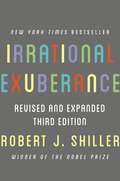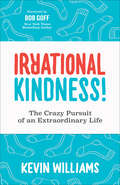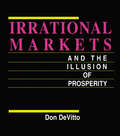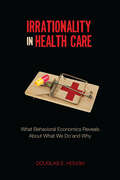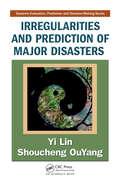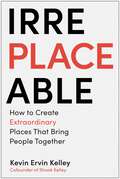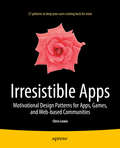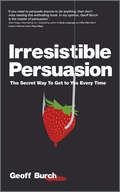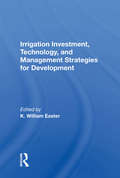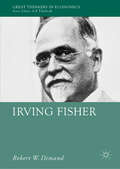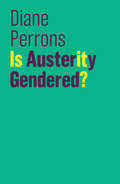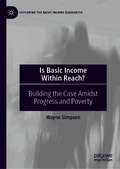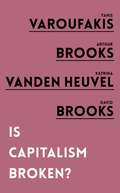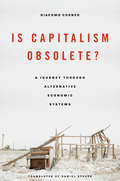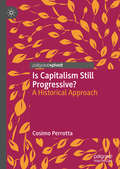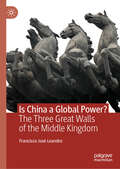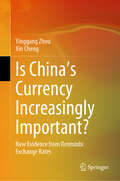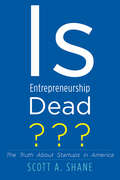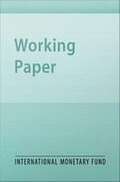- Table View
- List View
Irrational Exuberance in the U.S. Housing Market: Were Evangelicals Left Behind?
by Christopher CroweA report from the International Monetary Fund.
Irrational Exuberance: Revised and Expanded Third Edition
by Robert J. ShillerWhy the irrational exuberance of investors hasn't disappeared since the financial crisisIn this revised, updated, and expanded edition of his New York Times bestseller, Nobel Prize–winning economist Robert Shiller, who warned of both the tech and housing bubbles, cautions that signs of irrational exuberance among investors have only increased since the 2008–9 financial crisis. With high stock and bond prices and the rising cost of housing, the post-subprime boom may well turn out to be another illustration of Shiller's influential argument that psychologically driven volatility is an inherent characteristic of all asset markets. In other words, Irrational Exuberance is as relevant as ever. Previous editions covered the stock and housing markets—and famously predicted their crashes. This edition expands its coverage to include the bond market, so that the book now addresses all of the major investment markets. It also includes updated data throughout, as well as Shiller's 2013 Nobel Prize lecture, which places the book in broader context. In addition to diagnosing the causes of asset bubbles, Irrational Exuberance recommends urgent policy changes to lessen their likelihood and severity—and suggests ways that individuals can decrease their risk before the next bubble bursts. No one whose future depends on a retirement account, a house, or other investments can afford not to read this book.
Irrational Kindness!: The Crazy Pursuit of an Extraordinary Life
by Kevin Williams&“A thoughtful and fresh perspective on life&’s compassionate journey to success. Irrational Kindness is powerful, provocative, and palatable.&” —Linda Cash, former Vice President, Quality and New Model Launch Program at Ford Motor Company This work from a fast food entrepreneur and rare triple-franchisee Kevin Williams was written as part-employee handbook, part-operating manual for life. Irrational Kindness flips traditional wisdom on its head and gives a different lens through which to look at life. Often the idea of being irrational is smeared with negative connotations. It can sound illogical, senseless, unjustifiable, or groundless. It may even represent ludicrous and mad behavior! But Kevin Williams argues that being irrational can be just the opposite. And it is the most positive, inspiring, and empowering way to be. Being irrational has to do with thinking outside the box—way outside. It has to do with viewing life as a journey and still being willing to reverse the route, shake things up, or flip the map upside down. Why? Not just to be different, but to make a difference.Irrational Kindness can serve as a harmonious reminder that one&’s hopes and dreams do not have to be derailed—not by their fears, their pasts, or by people who make them feel like they have to know everything to be successful, or even just to get started. Throughout its pages, Kevin provides the inspiration everyone needs to favor understanding over being understood and prioritize kindness—toward themselves as well as others—over everything.&“This book is a needed and timely reminder to pause and give Kindness a platform to change the world around you.&” —Princess Moon, Podcast Artist & Encourager of People
Irrational Markets and the Illusion of Prosperity
by Don DeVittoFirst Published in 2001. Routledge is an imprint of Taylor & Francis, an informa company.
Irrational Tastes and Bottomless Soup Bowls: Our Unconscious Eating Habits and What They Tell Us about the Pitfalls of Free Markets
by Peter A. UbelFree markets operate under the assumption that human beings make rational choices about consumption. Some market enthusiasts have gone so far as to contend that even obesity is a lifestyle choice and, therefore, society should leave people alone to determine their optimal waistlines. Behavioral scientist and physician Peter Ubel, however, argues that it's actually the interaction of modern markets with genetics and social factors, and rational with irrational behavior, that has created the obesity epidemic. This theory suggests that the free market will never be able to solve the problem on its own, as so many free market advocates have claimed. This chapter is excerpted from "Free Market Madness: Why Human Nature Is at Odds with Economics--and Why It Matters."
Irrationality in Health Care: What Behavioral Economics Reveals About What We Do and Why
by Douglas E. HoughThe health care industry in the U.S. is peculiar. We spend close to 18% of our GDP on health care, yet other countries get better results—and we don't know why. To date, we still lack widely accepted answers to such simple questions as "Would requiring everyone to buy health insurance make all of us better off?" The standard tools of health economics can only take us so far. This book draws on behavioral economics as an alternative lens to provide more clarity in diagnosing the ills of health care today. A behavioral perspective makes sense of key contradictions—from the seemingly irrational choices that we sometimes make as consumers, to the incongruous behavior of providers, to the morass of the long-lived debate surrounding reform. With the new health care law in effect, it is more important than ever that consumers, the health care industry, and the policymakers who are governing change reckon with the power and sources of our behavior when it comes to health.
Irregular Migration and Invisible Welfare
by Maurizio AmbrosiniFocusing on care workers for the elderly, this book examines the paradoxical position of irregular migrants in European society, who are often labelled as 'illegal' residents but who in fact provide much needed, essential support to welfare systems.
Irregularities and Prediction of Major Disasters
by Yi Lin Shoucheng OuYangAlthough scientists have effectively employed the concepts of probability to address the complex problem of prediction, modern science still falls short in establishing true predictions with meaningful lead times of zero-probability major disasters. The recent earthquakes in Haiti, Chile, and China are tragic reminders of the critical need for
Irreplaceable: How to Create Extraordinary Places that Bring People Together
by Kevin Ervin KelleyAn Adam Grant Summer Reading Pick 2024Do we still need physical places like grocery stores, restaurants, and office buildings? Or will the &“Replacement Economy&” led by the tech titans and retail giants wipe out these venues in their rapid ascent to unicorn status? What about museums, universities, and performing arts venues? Considering the power of technology today, can&’t we replace these relics with faster, cheaper, and more efficient online tools, apps, and AI? Through engaging storytelling, human behavior insights, and proven design techniques, Kevin Kelley—an attention architect and cofounder of Shook Kelley, a strategic design firm that pioneered the field of &“convening&”—unfolds why physical places are essential to civil society, business, and community. In these pages, he reveals what it takes for brick-and-mortar establishments to attract an audience and maintain a competitive edge in our increasingly digital world, whether you&’re a: Retail leader or institutional manager trying to attract people to your offering while keeping the disruptors at bay Student of design who values social facilitation over object-oriented design Concerned citizen worried about the loss of community and civility Irreplaceable offers a welcomed antidote to the anti-human digital future crushing our main streets and infiltrating every corner of our lives. It provides a comprehensive roadmap for creating human experiences that have the power to convene and bring friends, neighbors, and strangers together in prosocial environments in ways the digital replacements can&’t replicate.
Irresistible Apps
by Chris LewisThis practical guide provides a comprehensive overview of professionally managed assets, or investments in which all portfolio decisions and rebalancing are delegated to a fund manager or third-party advice service. Savvy investors looking to achieve a better understanding of the nuances, benefits, and drawbacks of using these products?will find the answers they are looking for in?The Handbook of Professionally Managed Assets, ?no matter whether they would like to learn more about mutual funds or hedge funds. There is a considerable lack of knowledge among the investing public about how to properly construct a well-diversified portfolio of investments that includes a selection of professionally managed assets. As a long-standing financial planner, attorney, and educator, Keith Fevurly remedies this issue in The Handbook of Professionally Managed Assets?by clearly presenting the major categories of professionally managed assets and revealing the best tactics for investing in these vehicles. Along the way, he reveals each asset''s risks and rewards, and he also provides the in-depth knowledge and information investors need to confidently select the right assets for their portfolios. Filled with valuable insights for everyone from financial professionals to individual investors, The Handbook of Professionally Managed Assets?stands alone in its ability to shed light on the many investment vehicles that fall under the larger umbrella of professionally managed assets. With topics as wide-ranging as mutual funds, closed-end funds, unit investment trusts, exchange traded funds, hedge funds, managed futures, and more, this invaluable resource will give you the information you need to build a prosperous financial future for yourself and your clients.
Irresistible Persuasion
by Geoff Burch"Geoff Burch is the master of persuasion" -Allan Pease, International bestselling author of Why Men Don't Listen and Women Can't Read Maps This book will change your life. (Is that persuasive enough?) Getting what you want isn't easy. Why? Because most of us have no clear idea what we're looking for a lot of the time. The key to being brilliantly persuasive and influential is knowing exactly what you want before you set out to get it. Irresistible Persuasion presents a process that you can apply to any situation; you choose your starting point and your goal, then just join the dots. It's the only way to make success completely inevitable. Irresistible Persuasion shows you how to entice people to your point of view, how to overcome resistance, how a bit of showbiz can go a long way and why you should always consider the other person when you're negotiating. It's packed with new persuasion and influencing techniques as well as many powerful traditional methods. Geoff Burch is the presenter of BBC TV's All Over the Shop. When he's helped you decide what you want, he'll show you the irresistible way to get it. You won't just get more customers, you'll get more profitable customers.
Irrigation Investment, Technology, And Management Strategies For Development
by K. William EasterThis book reports on a study that assessed the effectiveness of irrigation technologies and management practices in the Third World. Using a management model, it offers new perspectives on the evaluation of investment priorities and the benefits of irrigation projects in developing countries.
Irrigation in the Mediterranean: Technologies, Institutions and Policies (Global Issues in Water Policy #22)
by François Molle Carles Sanchis-Ibor Llorenç Avellà-ReusMediterranean irrigation is diverse due to, among other factors, the relative importance of water in the economy of each country, varied levels of aridity, heterogeneous levels economic, social and technological levels of development, and differences in political and social organization. However, most of the Mediterranean countries face similar problems to meet their water demands because of the scarcity and variability of renewable resources, growing water requirements from non-agricultural sectors, increasing environmental concerns related to water quality and environmental degradation, a social demand for larger public participation, and important technological changes. The time has come to reconsider the “not one drop lost to the sea” philosophy of yesteryears largely and to 'live within limits'.This book focuses on eight selected countries (Tunisia, Morocco, Spain, France, Italy, Turkey, Israel and Egypt) and provides a comparative perspective that both thoroughly explores their specificities and identifies the common challenges faced by the irrigation sector in these countries. The book has been written at a critical moment, when the continued application of a supply-side water management model is revealing its unsustainable nature in numerous places; when significant technological changes are taking place in the irrigation sector; when new forms of management and governance are widely held as badly needed; and finally, when climate change is compounding many of the difficulties that have characterized irrigation policies and practices in the past decades.This complicated future context makes Mediterranean irrigation face various political dilemmas on water management, raising social tensions, triggering territorial and land conflicts, and stimulating new technological developments. This book provides a timely analysis of the particular trajectory of eight Mediterranean countries in these uncertain transformations, and attempts to identify the best strategies to avert or overcome future risks.
Irving Fisher: The Legacy Of A Great Economist (Great Thinkers in Economics)
by Robert W. DimandAcclaimed by Joseph Schumpeter as ‘The greatest economist the United States has ever produced’, this book examines the life and work of American economist and statistician Irving Fisher (1867–1947). Fisher’s reputation suffered for decades after his incorrect predictions for the stock market in October 1929 and the impact of Keynesian macroeconomics, but the importance of his work came to be recognized through the advocacy of many prestigious scholars including Milton Friedman, Hyman Minsky and James Tobin. With pivotal contributions including his Debt-Deflation Theory, Fisher Diagram and Ideal Index Number, his research in neoclassical economics influenced policymaking in his own day as well as during the recent financial crisis. This volume will be of interest to all those interested in the twentieth century transformation of economics.
Is Anyone Listening?: Accountability and Women Survivors of Domestic Violence
by Gill Hague Audrey Mullender Rosemary ArisDomestic violence is in the public eye as never before, but how often are abused women consulted or involved in the new services and policies? This book investigates, and reveals that the voices of survivors of domestic violence are often simply not heard; silenced, the women themselves become invisible. Is Anyone Listening? draws on the experiences of other service user movements to provide a strong conceptual framework for thinking about abused women's participation in policy and service development. It discusses empowerment issues and the women's movement against gender violence, exploring how far refuge organisations and other women's movement services have influenced statutory services and vice versa. It includes many practical ideas for involving women in the improvement of both policy and practice and gives examples of inspiring and innovatory projects.Based on a study carried out as part of the Economic and Social Research Council's Violence Research Programme, Is Anyone Listening? offers a unique analysis of the sensitive and complex issues involved in developing service user participation within the domestic violence field. The insights it provides will enable policy-makers, activists, students, practitioners and women who have experienced domestic violence to move forward together.
Is Austerity Gendered? (The Future of Capitalism)
by Diane PerronsAusterity has dominated the policy agenda in the past decade. Although it appeared to end with the COVID-19 pandemic, a return to harsh cutbacks in the future cannot be ruled out. In this incisive analysis, Diane Perrons shows that while austerity policies have devastating effects on people's lives, their gendered dynamics are particularly conspicuous: budget cuts have been overwhelmingly aimed at services used by women. She shows how the gender aspects of this economic and social catastrophe intersected with a range of other factors, making the experience of austerity very different for different groups - and highly unjust. Not only that, it undermined responses to COVID-19. She finishes by critiquing the justifications for austerity policies and asks whether there are compelling alternatives that can re-invigorate economies and societies after the pandemic, and avoid a return to austerity. This compelling book will be essential reading for activists, policymakers and students of feminist political economy everywhere.
Is Basic Income Within Reach?: Building the Case Amidst Progress and Poverty (Exploring the Basic Income Guarantee)
by Wayne SimpsonThis book examines the evolution of basic income policy and research in advanced economies and is divided into two parts. The first section considers the development of basic income as a social policy initiative in advanced (OECD) nations from the 1960s to today. It reviews what the negative income tax experiments accomplished, their limitations, and what they can lend to the design and implementation of basic income pilots or a full blown basic income program today. It also considers important developments and research in poverty and economic inequality and in technological change and labour market adjustment over the last half century. The second section focuses on the Canadian case, where the prospects for basic income are perhaps among the most promising. In addition to a review of Mincome and its lessons and limitations, this section considers important developments in poverty research by the Economic Council of Canada and the Canadian Senate in the 1960s, attempts at welfare reform, and the policy initiatives to develop a basic income for elderly Canadians that has endured to this day. Many of the important social and technological developments that are reviewed in the first part will be discussed in more detail with specific reference to the Canadian case. The evolution of the important policy innovations―the National Child Benefit and its successors and the Poverty Reduction Strategy―are outlined in detail and linked to other, more modest, income support initiatives such as the federal sales tax credit that provide a potential foundation for a comprehensive basic income plan in Canada. Research, including recent microsimulation studies of a basic income, are critically reviewed. Although the COVID-19 pandemic has increased interest in basic income to support those hardest hit, the book argues for careful design of basic income policies in its aftermath rather than simplistic adoption of emergency pandemic measures.
Is Business Bluffing Ethical?
by Albert Z. CarrBusiness, like poker, is often a game of strategic bluffs. The worlds of private and business life are separate and demand separate codes of ethics. The pressure to deceive is felt everywhere in business and deceptions are ethically justifiable. If public opinion and legal authorities raise a clamor, industry will create and enforce its own code to avoid government regulation. Blatantly unethical practices only serve to spoil the consumer environment in the long run. Aggression and competition are built into our society and business provides a useful outlet for them. The individual is pressured in many of these instances and must subordinate his feelings to carry out the objective. Departing from the strict truth and the golden rule is part of the strategy of business.
Is Capitalism Broken?
by David Brooks Arthur Brooks Yanis Varoufakis Katrina vanden Heuvel'We need to organise politically to defend the weak, empower the many and prepare the ground for reversing the absurdities of capitalism.' – Yanis Varoufakis 'Capitalism over the past twenty-five years has been an incredible moral good.' – David Brooks The Munk debate on capitalism There is a growing belief that the capitalist system no longer works. Inequality is rampant. The environment is being destroyed for profits. In some western nations, life expectancy is even falling. Political power is wielded by wealthy elites and big business, not the people. But for proponents of capitalism, it is the engine of progress, not just making all of us materially better off, but helping to address everything from women&’s rights to political freedoms. We seem to stand at a crossroads: do we need to fix the system as a matter of urgency, or would it be better to hold our nerve?
Is Capitalism Obsolete?: A Journey through Alternative Economic Systems
by Giacomo CorneoGiacomo Corneo presents a refreshingly antidogmatic review of economic systems, in the form of a fictional dialogue between a daughter indignant about economic injustice and her father, a professor of economics. They tour hypothetical systems in which production and consumption obey noncapitalistic rules and test the systems’ economic feasibility.
Is Capitalism Still Progressive?: A Historical Approach
by Cosimo PerrottaThe economic crisis of 2007/2008 has prompted much debate as to what caused it and what remedies may be implemented in order to regain a healthy economy. This book addresses these issues through the lens of capitalism with a focus on labour economics, arguing that capitalism, and the employment of young people and migrants, may be a suitable antidote to the ongoing political crises in Europe that are taking place as a result of the financial crisis.Using economic history and the history of economic thought to inform debate, Is Capitalism Still Progressive?: A Historical Approach will be of interest to policy makers (especially in emerging countries), students and researchers interested in exploring the pros and cons, and persistence, of the capitalist system.
Is China a Global Power?: The Three Great Walls of the Middle Kingdom
by Francisco José LeandroThis book offers a thorough geopolitical analysis of modern China through the lens of defensive realism. It uniquely scrutinizes China's "globalness" within the taxonomy of great powers, challenging the common narrative of China as a global power. In doing so, the book presents an empirical-qualitative model to assess China's global power status, encompassing four dimensions: 1) The Great Wall of Technology and Economic Access (Material Power); 2) The Great Wall of Cultural and Intangible Access (Intangible Power); 3) The Great Wall of Political Access and Global Governance (Governance Power); and 4) an analysis of China&’s comprehensive power. Drawing from firsthand observations, the book examines China's ascent in the international order, emphasizing its strengths and vulnerabilities. With this, it concludes that China has a global vision and ambition, positioning itself as a quasi-global power. Essential for scholars, policymakers, and global politics enthusiasts, this book is a valuable contribution to existing international relations scholarship.
Is China's Currency Increasingly Important?: New Evidence from Renminbi Exchange Rates
by Xin Cheng Yinggang ZhouChina’s economic achievements laid solid foundations for RMB's international standing. By the end of 2022, China accounted for 18.6% of the global economy and 14.4% of world exports.However, there is a huge gap between the yuan’s growing prominence and its global use. RMB remains underutilized compared to the U.S. dollar. This book attempts to fill this gap from the view of the systemic importance of the RMB exchange rate, an angle that could be easily overlooked. We argue that pricing is too important to be relegated to an afterthought. The change of RMB exchange rate could have a systemic impact on the global financial system. Furthermore, we present substantial evidence that RMB is gaining importance globally and regionally as an anchor currency and safe-haven currency, indicating that RMB is becoming systemically important despite its relatively limited international use.It is important to understand in depth that the force that has helped fuel China’s rapid economic growth over the past few decades has been globalization and that market reform and opening up are the pillars of RMB internationalization. Currently, the new trends of anti-globalization and de-financialization have emerged. The global monetary and financial system must be reframed according to the financial needs of socially sustainable activities to prevent systemic instability and system-wide economic/social catastrophes. Against this backdrop, further internationalization of RMB should serve the real sectors in high-quality economic development.
Is Entrepreneurship Dead?: The Truth About Startups in America
by Scott A. ShaneIt’s become an article of faith that American entrepreneurship is in trouble. The problems are many: lack of capital, too few entrepreneurial immigrants, excessive regulation, an aging population, slowing population growth, and rising student debt. But while experts across the country debate the causes and propose solutions, Scott Shane explains that the data just do not fit. Dismantling each of the most widely accepted theories in turn, he persuasively demonstrates that—while an evolving market is changing the nature of most startups—entrepreneurship is actually alive and well. Shane reveals how the number of incorporated startups is rising, fewer startups are failing, and the number of businesses backed by investors is increasing. The overall picture is positive. Exhaustively researched and compellingly told, this book will be read and discussed for years to come.
Is Exchange Rate Stabilization an Appropriate Cure for the Dutch Disease?
by Ruy Lama Juan Pablo MedinaA report from the International Monetary Fund.

